Dialect
mid 16th century (denoting the art of investigating the truth of opinions): from French dialecte, or via Latin from Greek dialektos ‘discourse, way of speaking’, from dialegesthai ‘converse with’ (see dialogue).
wiktionary
From Middle French dialecte, from Latin dialectos, dialectus, from Ancient Greek διάλεκτος(diálektos, “conversation, the language of a country or a place or a nation, the local idiom which derives from a dominant language”), from διαλέγομαι(dialégomai, “I participate in a dialogue”), from διά(diá, “inter, through”) + λέγω(légō, “I speak”).
etymonline
dialect (n.)
1570s, "language, speech, mode of speech," especially "form of speech of a region or group, idiom of a locality or class" as distinguished from the general accepted literary language, also "one of a number of related modes of speech regarded as descended from a common origin," from French dialecte, from Latin dialectus "local language, way of speaking, conversation," from Greek dialektos "talk, conversation, speech;" also "the language of a country, dialect," from dialegesthai "converse with each other, discuss, argue," from dia "across, between" (see dia-) + legein "speak" from PIE root *leg- (1) "to collect, gather," with derivatives meaning "to speak (to 'pick out words')").
